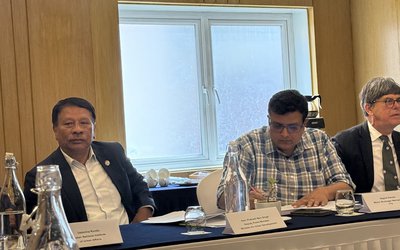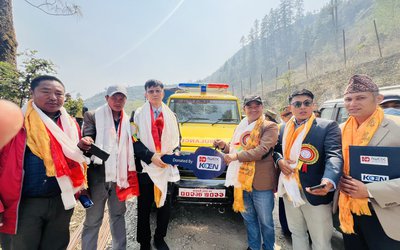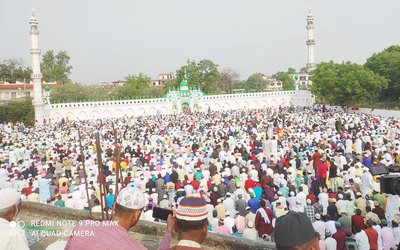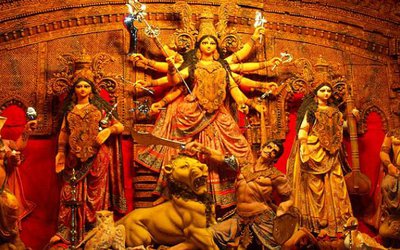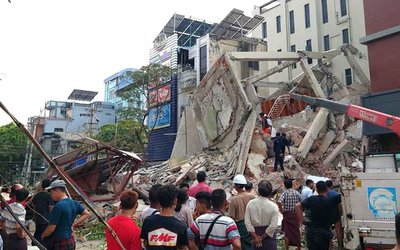This essay will try to do the most difficult thing in the world: to convince someone else when you yourself are not convinced. In Nepal right now, defending Narendra Modi or India is an impossible task, even for those who call themselves “Friends of BJP in Nepal” and who now hide from others that title which a year earlier they carried with some pride. However, even for a long-standing critic of India’s Nepal policy such as this essayist, that painful task is a necessity in the interest of good neighbourliness, especially prior to PM Oli’s imminent visit to the Delhi Durbar.
A quixotic phrase – rahar hoina badhyata (not a self-willed wish but a coerced compulsion) – has achieved wide political currency among the Loktantricksters as a mantra of impotence since the regime change of 2005. It has been used to justify many constitutionally and politically illegitimate actions, from the resurrection of a date-expired and dead parliament in 2006 to the late Sushil Koirala throwing all gentlemen’s agreements to the wind and standing anew for prime minister in October last. Following that glorious tradition, this essay will make a desperate attempt to see whatever faint silver lining there is among the dark clouds of Indo-Nepal relations.
The audience terrain for such a message is currently very hostile: even the handful of Madheshi leaders identified with the blockade are now yelping in pain, bleating to anyone who would care to listen that they stuck their necks out for Delhi and, on Indian request, provided it the fig-leaf that it was they who imposed the blockade and not India. However, just as mysteriously as it was imposed, the blockade was lifted without Delhi even bothering to consult those that provided the fig-leaf – except for Rajendra Mahato who, when he lost the last election, said it was India and not he that had lost.
So, to the 85% of Nepal’s population that is resentful of India is now added the fifteen or so percent that constitutes what is a new and very recent social construct – the Madheshis, essentially a hotchpotch of high caste east Tarai landlords who were historically the main oppressors of Tarai’sDalits and the poor. They are only the latest set of Nepali political activists who feel used and betrayed by India, the earlier one preceding them being the anti-king civil society stalwarts of 2005. They too stuck their necks out and provided the fig-leaf of fake Nepali patina to the regime change pursued by a security-paranoid and Sinophobic India with the November 2005 Twelve Point Delhi deal. They too have been sulking of late, unable to speak out publicly since their credibility was used to promote foreign interests in Nepal’s governance and which is thus currently in tatters.
The pre-blockade Narendra Modi was seen as having radically reoriented India’s neighbourhood policy from that of security paranoia to that of development with India as the engine of growth. With the blockade, however, Modi has revealed himself to be as weak as Gujral before him, unable to prevent the spooks and Babus riding him instead of the other way around, someone who has lost the plot. Even with such an obvious handicap, defending Modi has been made somewhat easy by the taciturn PM Manmohan Singh who has finally spoken after leaving office.
In an interview given to India Today a week back, Singh, even as he correctly assesses the Madhesh situation as one of India communally backing a minority of loser leaders, accuses Modi of misusing the leverage India has over Nepal which it previously had “always utilized it for the good of Nepal-India relations”. Now this Modi bashing is fair game in politics: that’s the nature of competitive democracy and if you can’t stand the heat, don’t go into the political kitchen. However, saying that previous Congress governments have always used the natural leverage they have over Nepal to good ends is blatantly disingenuous.
Just going back over history, there were two major previous economic blockades of Nepal by Congress-led governments, the longest 13-month one starting in March 1989 under Rajiv Gandhi that essentially prevented the modernization of the Nepal Army and allowed rag-tag insurgents to terrorize large areas of Nepali rural hinterlands. The Maoist insurgency began when NarasimhaRao was prime minister of India (and Mr Singh his finance minister); it was nurtured and provided safe haven in and by Delhi under Gujral and Vajpayee (whose government, as per Prof. Muni in his notorious chapter in Nepal in Transition,saw by June 2002 the capitulation before India’s spookdom of insurgency leaders Prachanda and Baburam); but it graduated to the stage of a blatant proxy war against Nepal from May 2004 till the notorious 12-point Delhi Deal under Mr Singh’s watch in November 2005 after the Dhaka SAARC summit.
After sidelining the monarchy, Delhi spookdom then went on to cut different political forces down to size using blatant communalism: first to suffer was the Nepali Kangress when their Tarai leaders were hived off to agitate for anti-hill regionalism. Next the Maoists had to be downsized and this was assured with the impasse and dissolution of the first Constituent Assembly, the imposing of a chief-justice led interim government, and the exclusion of the ‘Dash’ Maoists from the parliamentary process (just as they had been excluded from the 2005 Delhi Deal when DashistGajurel and Vaidya were jailed to facilitate its signing). The subsequent political instability and mess in Nepal over the last decade can be termed ‘good ends’ by Mr Singh under whose watch much of this happened but it is hardly something history will forgive him or other Indian leaders for.
Mr Modi did not create all this mess: he inherited it from the Congress, together with the duplicitous decisions of the Vajpayee-Jaswant Singh government till May 2004. Jaswant Singh enjoys the distinction of having labeled Maoists as ‘terrorists’ even before monarchial Nepal had done so, but then his government was busy giving them shelter and political patronage in the background. Modi and Sushma Swaraj should be credited for at least trying to change all of it when they came to power, telling the Madheshi leaders that they could hardly claim discrimination if the country had Madheshis as president, vice-president and chief justice, and advising them to work towards a Nepal that unified the mountain, hills and Tarai. They should now be pitied for failing to enforce that positive turn in neighbourhood policy and instead capitulating to the Babu and Spookdom’s policy of status quo ante paranoia, reverting to seeing the neighbourhood exclusively through the security lens.
With the blockade now partially lifted, and the red light having turned yellow and not yet green, mainly to facilitate Oli’s forthcoming visit to Delhi, there are faint signs that some stock-taking of the long-term damage to India’s interests is underway. How honest that effort will be can only be judged from the results. This essayist went to New Delhi for a conference at the end of January. These days I hate showing my passport as the Indian immigration has started stamping it with the arrival date which they did not previously, thus unnecessarily wasting scarce pages in my passport. Taking advantage of the 1950 Treaty, I make it a point to present my Nepali citizenship certificate instead. This time, instead of letting me through right away, the officer went to consult his superiors leaving a long line of irritated passengers behind me. When he came back, his fellow officer in the adjacent booth asked, ‘Kya huwa? (what happened?)’ He replied in Hindi that many Indians come now with fake Nepali citizenship documents and that has become a security risk.
I was very pleased to hear that and mentally thanked Mr Modi and his government for acknowledging a problem that will haunt India long into the future. It was created by India’s spookdom as quid pro quo, the unwritten 13th point of the notorious 12-point Delhi Deal of 2005. This granting Nepali citizenship to over 3 million people, not necessarily the deserving Nepali Tarai or hill citizens but Indian criminals and others from Philibhit in the west all the way to Siliguri in the east, was of great help in assuring that India-backed Madheshi leaders won the CA elections while Kangress, UML and Maoist stalwarts lost. For those who bought such certificates, as the Godfather Don Corleone might have said, it was ‘just business’, an investment used to great effect during the blockade to engage in black-marketing of fuel and other products. It will for sure be traded in the future for more lethal products.
Mr. Modi and Mr. Oli, are you ready for a genuine review of the duplicitous shenanigans that have been perpetrated in Indo-Nepal relations over the last two decades and proper course corrections? History’s eyes are on you.

Dipak Gyawali
Gyawali is Pragya (Academician) of the Nepal Academy of Science and Technology (NAST) and former minister of water resources.
- Re-Thinking Democracy: Why South Asians Are worried
- Mar 17, 2025
- Nepal’s Governance Mired In Endemic Corruption
- Feb 20, 2025
- What Might The Age Of Trump Look Like?
- Jan 22, 2025
- Kathmandu Dialogue With Dugin
- Dec 25, 2024
- Bioregionalism Satsang
- Sep 27, 2024



